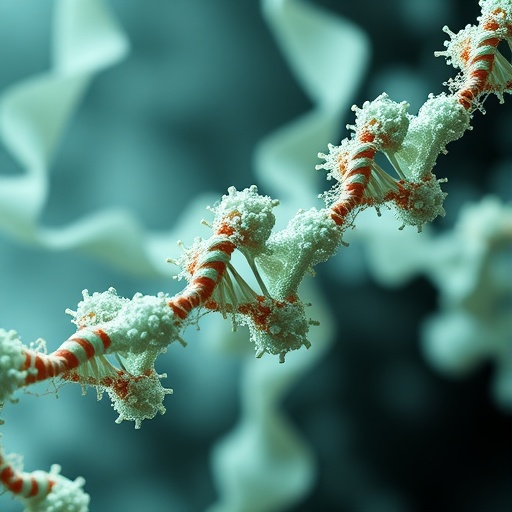
In a recent study published in the Journal of Translational Medicine, researchers have opened a new dialogue concerning the complex interplay between dietary lipids and menopausal symptoms. The investigation, led by esteemed scientists including Verde, Barrea, and Frias-Toral, among others, zeroes in on the timing of lipid intake and its potential ramifications on women’s health during menopause. Given the prevalent discourse around estrogen and hormonal therapies, this research casts a light on an often overlooked yet vital component of menopause management: nutrition.
Menopause, a natural biological process, is characterized by the cessation of menstruation and a decline in hormone levels, especially estrogen. This transition is frequently accompanied by an array of symptoms, including hot flashes, mood swings, and disturbances in sleep. Considering these symptoms can profoundly affect quality of life, researchers are eager to unravel the mechanisms that can alleviate discomfort during this phase. The study of lipid intake is particularly intriguing, as certain fats have been shown to exert anti-inflammatory effects and influence hormonal balance.
Interestingly, the latest findings suggest that the timing of lipid consumption throughout the day can alter its effects on menopausal symptoms. This notion challenges conventional dietary recommendations that do not take timing into account. By meticulously tracking lipid intake patterns among postmenopausal women, the researchers were able to identify trends that could guide more tailored dietary strategies. This individualized approach to nutrition aligns with a broader movement toward personalized medicine, which aims to provide interventions that are uniquely suited to the individual rather than a one-size-fits-all model.
Fats, often demonized in the dietary world, are essential to numerous bodily functions, including hormone production, cellular repair, and energy storage. Distinguishing between different types of fats is crucial; unsaturated fats, which are prevalent in olive oil, avocados, and fish, are believed to confer various health benefits, including improvements in cardiovascular health and reductions in inflammation. Conversely, trans fats and excessive saturated fats can contribute to various health issues. This distinction becomes even more significant during menopause when hormonal changes may render women more susceptible to metabolic disorders.
The study’s methodology involved comprehensive dietary assessments alongside physiological evaluations, enabling researchers to draw connections between lipid timing and symptom severity. Women who implemented strategic timing in their lipid intake reported noticeable differences in their symptomatology. For instance, those who consumed healthy fats earlier in the day experienced less intensity in hot flashes, potentially due to enhanced metabolic processing during daytime hours. By providing actionable insights based on these findings, the work paves the way for future exploration into dietary interventions as a means to mitigate menopausal challenges.
Moreover, the psychological aspects of managing menopausal symptoms cannot be ignored. Many women face emotional distress during this time, with symptoms like anxiety and depression exacerbating physical discomfort. Emerging evidence suggests that diet, including lipid intake, plays a foundational role in mental health. The anti-inflammatory properties of certain fats are believed to support brain health, positively influencing mood and stress levels. As such, the implications of this study extend beyond physical manifestations, interfacing with the realms of psychological well-being as well.
Engagement in physical activity must also be considered when discussing lipid intake and menopausal symptoms. Regular exercise has been shown to have numerous benefits, from improving hormonal balance to enhancing overall mood. When combined with strategic dietary changes, such as those suggested by the latest research, women may experience an even more profound alleviation of symptoms. The synergetic effect of diet and exercise supports the idea that approaching menopause requires a multifaceted strategy that encompasses lifestyle modifications.
The researchers took care to emphasize that their findings add to a burgeoning body of literature advocating for dietary changes to manage menopause symptoms. This is particularly timely given the global interest in health-oriented lifestyles and sustainable eating practices. Interestingly, discussions surrounding women’s health have gained momentum in recent years, leading to greater awareness and advocacy, which could facilitate the adoption of evidence-based dietary recommendations.
Additionally, the study’s implications extend to healthcare professionals who are integral in assisting women through menopause. With the insights gained from this research, practitioners could offer more sophisticated dietary counseling that considers lipid timing, amplifying the standard care protocols traditionally focused on hormonal treatments. Training for healthcare providers to recognize the importance of nutrition can bridge the gap between research and practical application, ultimately improving patient quality of life.
This study also beckons further inquiry into the mechanistic pathways involved in the relationship between fats and hormonal balance. Future research should aim to unearth specific biochemical processes that dictate how lipid consumption influences menopausal symptoms. Understanding these pathways could pave the way for more precise dietary interventions, enriching the overall understanding of women’s health.
The concept of dietary timing in relation to health has seen interest beyond menopause, raising essential questions regarding our overall eating patterns. As science increasingly reveals the rhythmic characteristics of human physiology—such as circadian rhythms—this study contributes to the conversation, suggesting that meal timing, much like the types of foods consumed, is integral to health outcomes. This realization could reshape recommendations not just for menopause but for a variety of health conditions.
In a world where health information is often conflicting and overwhelming, clarity around nutrition comes as a welcome reprieve. Women navigating the complexities of menopause can take charge of their health by understanding these principles, making informed choices rooted in scientific evidence. This study’s findings are a beacon of hope, illuminating pathways to enhance the lives of countless women facing menopausal challenges.
In summary, the recent study published by Verde and colleagues heralds a new frontier in understanding the connection between lipid intake and menopause. The research advocates for informed dietary practices designed with careful timing, opening doors for women to reclaim their quality of life during a challenging transition. It beckons a shift in how nutrition is conceptualized and practiced, urging a nuanced approach that recognizes the importance of both what we eat and when we eat it.
The implications of these findings may extend far beyond individual health, influencing public health messaging and personal empowerment in women’s healthcare. The study encapsulates the essence of contemporary science—working to bridge the gap between research and real-world applications, ultimately fostering a healthier future for women everywhere.
By addressing the timing of lipid intake, researchers are effectively challenging the narrative around menopause and nutrition, engendering new possibilities for symptom relief and well-being. In an age where we are witnessing a renaissance in women’s health discussions, this groundbreaking research could very well be a catalyst for transformative change within the community and beyond.
Subject of Research: The influence of lipid intake timing on menopausal-related symptoms.
Article Title: Timing matters: lipid intake and its influence on menopausal-related symptoms.
Article References:
Verde, L., Barrea, L., Frias-Toral, E. et al. Timing matters: lipid intake and its influence on menopausal-related symptoms.
J Transl Med 23, 934 (2025). https://doi.org/10.1186/s12967-025-06705-x
Image Credits: AI Generated
DOI: 10.1186/s12967-025-06705-x
Keywords: Menopause, Lipid intake, Timing, Dietary intervention, Women’s health.
Tags: anti-inflammatory effects of dietary lipidsdietary fats and women’s healthhormonal balance and dietary timinghot flashes and dietary interventionimpact of nutrition on hormone levelsJournal of Translational Medicine findingslipid intake and menopausal symptomsmenopause management strategiesmood swings during menopauseresearch on menopause and nutritionsleep disturbances and nutritiontiming of nutrient consumption




